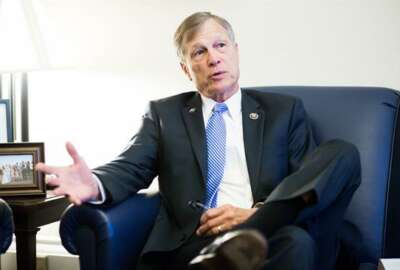
Biden transition team encounters thick fog on diversity at Foggy Bottom
In today's Federal Newscast: A top Biden transition-team member encounters bad climate on diversity at Foggy Bottom. Some federal workers might be getting a pay...
To listen to the Federal Newscast on your phone or mobile device, subscribe in PodcastOne or Apple Podcasts. The best listening experience on desktop can be found using Chrome, Firefox or Safari.
- President-elect Biden’s State Department transition team, among other efforts, is shining a light on diversity. Linda Thomas-Greenfield, a top official for State Department policy in the transition team, said a recent executive order from President Donald Trump has had a chilling effect on diversity and inclusion plans at the agency. “There’s no way, given the current environment, they can even begin the process of dealing with diversity issues in a department when you can’t even use the word diversity,” she said. As the State Department’s former director-general of the Foreign Service and director of human resource, Thomas-Greenfield said the agency is getting a more diverse pool of applicants for promotions, but that diversity hasn’t yet filtered up through the higher ranks.
- No surprise, perhaps: Federal employees groups do not have nice things to say about the latest pay freeze proposal. The proposed federal pay freeze from the Senate is earning some harsh criticism. The American Federation of Government Employees said Senate Republicans are trying to outdo President Trump. Trump had proposed a 1% pay raise for civilian employees next year. The Federal Managers Association described the Senate’s pay freeze proposal and the timing of its release as “a double whammy.” FMA said Congress, at the very least, should support a 1% raise. (Federal News Network)
- The Senate Appropriations Committee released its bill for 2021, six weeks into the ongoing fiscal year. The Senate Appropriations Committee wants to give $690 billion dollars to the Defense Department this fiscal year. The legislation does not encompass all of the funds that will go toward the military. Other money falls under the jurisdiction of various committees and will likely total about $741 billion dollars. The bill includes a 3% raise for military service members. It also decreased research and development spending from the president’s request by more than $2 billion dollars. The bill will also fund 96 F-35 jets. That’s 17 more than what the Pentagon requested.
- One member of the House Space Force Caucus promises to not only bolster the force but do it in a bi-partisan way. Guarding satellites and communications, and preventing surprise attacks are among the goals of the new caucus, according to member Rep. Brian Babin (R-Texas). The Houston-area Republican says the Space Force itself was prompted by increasingly threatening stances by Russia and China. Babin says the caucus has grown to some 20 members, many from space neighborhoods here on earth, like Texas, Colorado and Florida, and with members from both parties.
- U.S. Northern Command said the military’s Joint All Domain Command and Control system is informing its budget priorities for the next two years. JADC2 will allow the military to take in and interpret multiple streams of information and deliver it to decision-makers quickly. NORTHCOM commander Gen. Glen VanHerck said the military needs to collect more data and make it more easily shared in order for JADC2 to work. He said future investments will work on connecting agency data stovepipes.
- Congress remains lukewarm in funding centralized IT modernization efforts. The Senate joined the House in allocating only $25 million dollars for the Technology Modernization Fund for fiscal 2021. Despite efforts by lawmakers in both houses to increase the TMF, appropriators chose not to meet the administration’s request of $150 million dollars. This is the second year in a row that the House and the Senate decided $25 million dollars was all that the centralized technology fund would receive. At the same time, however, Senate lawmakers went above the administration’s request to $12.5 million dollars for the IT Oversight and Reform fund.
- Small businesses get the first look at the Homeland Security Department’s plans for its highly anticipated First Source 3 contract vehicle. DHS released the draft solicitation for the small business set-aside multiple award contract that has a $10 billion dollar ceiling over 10 years. DHS is seeking feedback on its plan to create a contract for value-added resellers of technology products and software license providers. DHS says it may issue one statement of work for each area, or one for both. Comments on the draft solicitation are due by November 20.
- The Army is working with the Defense Department’s Joint Artificial Intelligence Center and Defense Innovation Unit to make sense of its financial data through robotic process automation. The Army selected the vendor DataRobot to support its work using RPA to resolve financial errors and process financial data for audit requirements. The Army specifically seeks DataRobot’s help addressing unmatched transactions, which are less than 1% of DoD’s financial transactions.
- The Federal Service Impasses Panel is out with a long-awaited decision on collective bargaining in the Department of Veterans Affairs. The panel weighed in on 44 contract articles that VA and the American Federation of Government Employees could not agree to. The decision gives VA and AFGE a seven-year contract. It also gives employees less time to appeal disciplinary actions. And it canceled labor-management training for employees. VA described the decision as a huge win and one that will improve the department’s operations.
Copyright © 2025 Federal News Network. All rights reserved. This website is not intended for users located within the European Economic Area.
Peter Musurlian
Peter Musurlian is a producer at Federal News Network.
Follow @PMusurlianWFED
Related Stories
Related Topics





